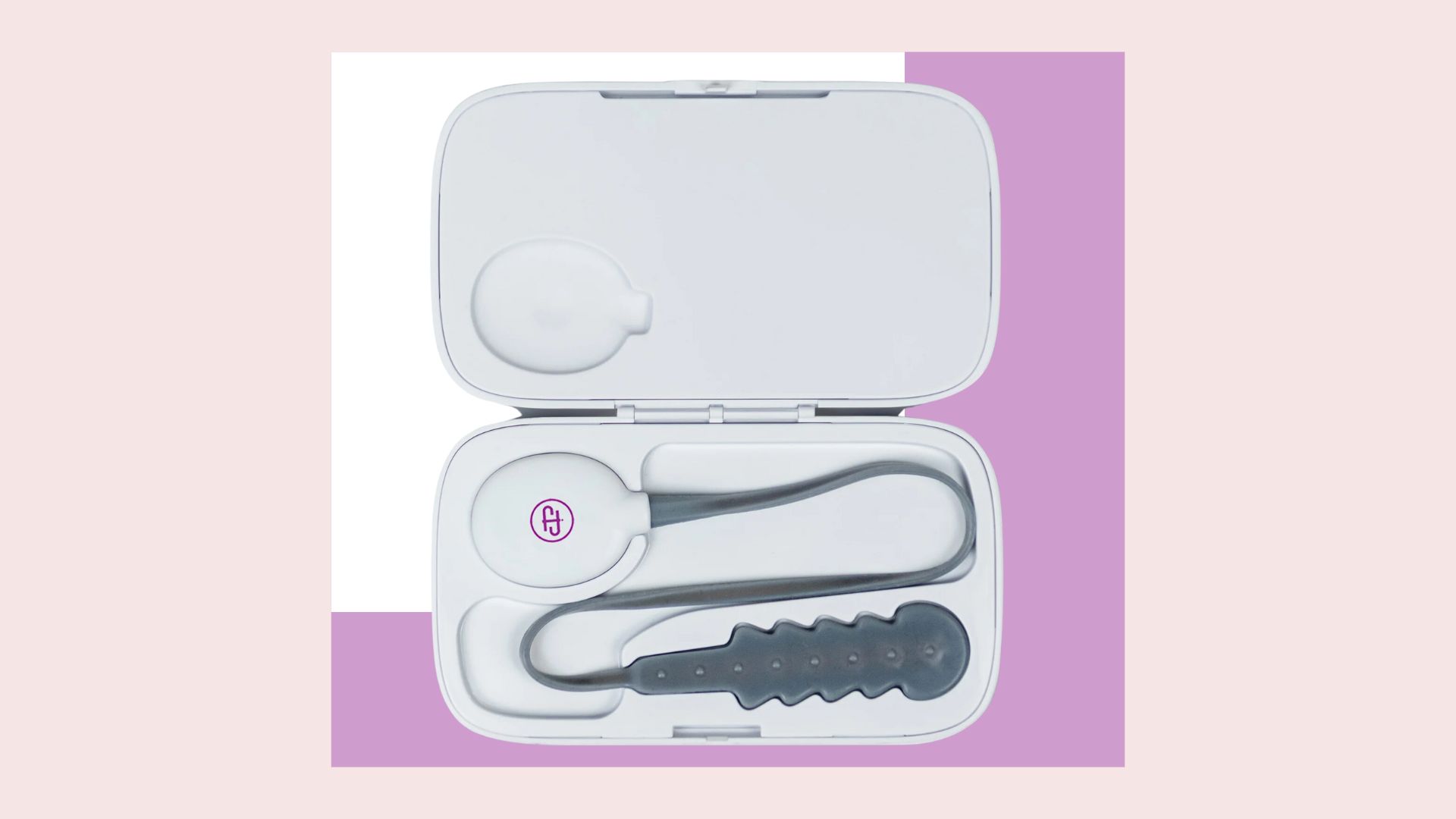
Lost continence? If you fret when you sneeze, clench when you cough and think they should hand out Tena Lady with the sticky socks when you arrive at a trampoline park, consider getting a pelvic floor trainer. Anyone can do pelvic floor exercises; you don’t need a gadget. But devices like the Femfit encourage you to do them - and even teach you how.
The Femfit by Junofit boasts eight sensors, making it one of the best pelvic floor trainers around as it offers more than any other pelvic floor trainer I've tried - and as one of woman&home's resident tech testers, I've tried a few. It pairs via Bluetooth with an app that gives you real-time feedback as it takes you through daily exercises. It’s pricey but clinically proven to lessen up to 80% of urinary incontinence symptoms in 12 weeks with its Strength Builder programme.
The device comes from down under (pun intended). Its maker Junofem is based in New Zealand. Until recently, Femfit was only on sale there and in Australia. What sets the device apart is detailed data – which is gamified on screen for you but can also be shared with professionals should you need a little extra help with how to use a pelvic floor trainer.
Junofem Femfit pelvic floor trainer review
Specifications
- Material: Silicone
- Weight: 19g (sensor plus pod)
- Dimensions: 85x24x4mm sensor
- Charge time: 2 hours
- Battery: USB rechargeable
- Running time: 15+ hours
- Warranty: 1 year
- Waterproof: Sensor yes (IP67), pod no (IP22)
- Storage: Comes with a charging case
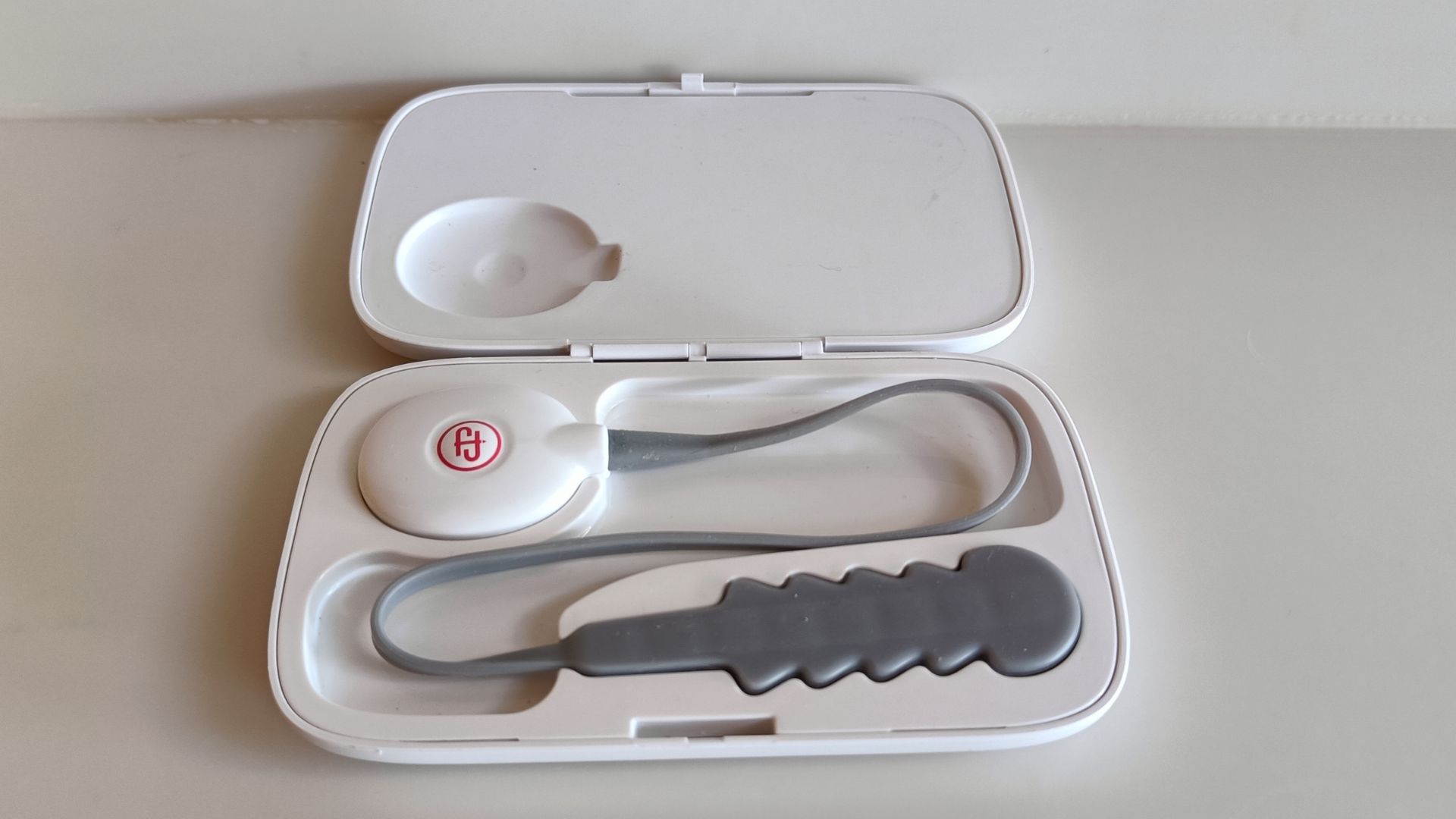
Who does the Junofem Femfit suit?
The Junofem Femfit pelvic floor trainer looks rather dull in grey - and it’s pricey - but it’s a serious piece of equipment. Its eight sensors measure the strength of your pelvic floor muscles in detail. In fact, the uppermost sensor measures abdominal pressure. Your goal then is to get stronger readings on other sensors than that one. On-screen programmes are like games: you follow a line. Across the bottom, eight bars indicate the pressure readings of the sensors, so you can visualise what muscles are working.
If you’re seeing a medic for incontinence, and they have a Femfit clinician code, you can also opt to share your data with them. They can see the same data you can see, and talk to you about technique and adherence.
But many users will buy a Femfit *instead* of seeing a professional for help. And that’s ok if your issue is pelvic floor muscle strength...after all, the doctor can’t actually do your kegel exercises for you. At least this device is designed to teach good technique.
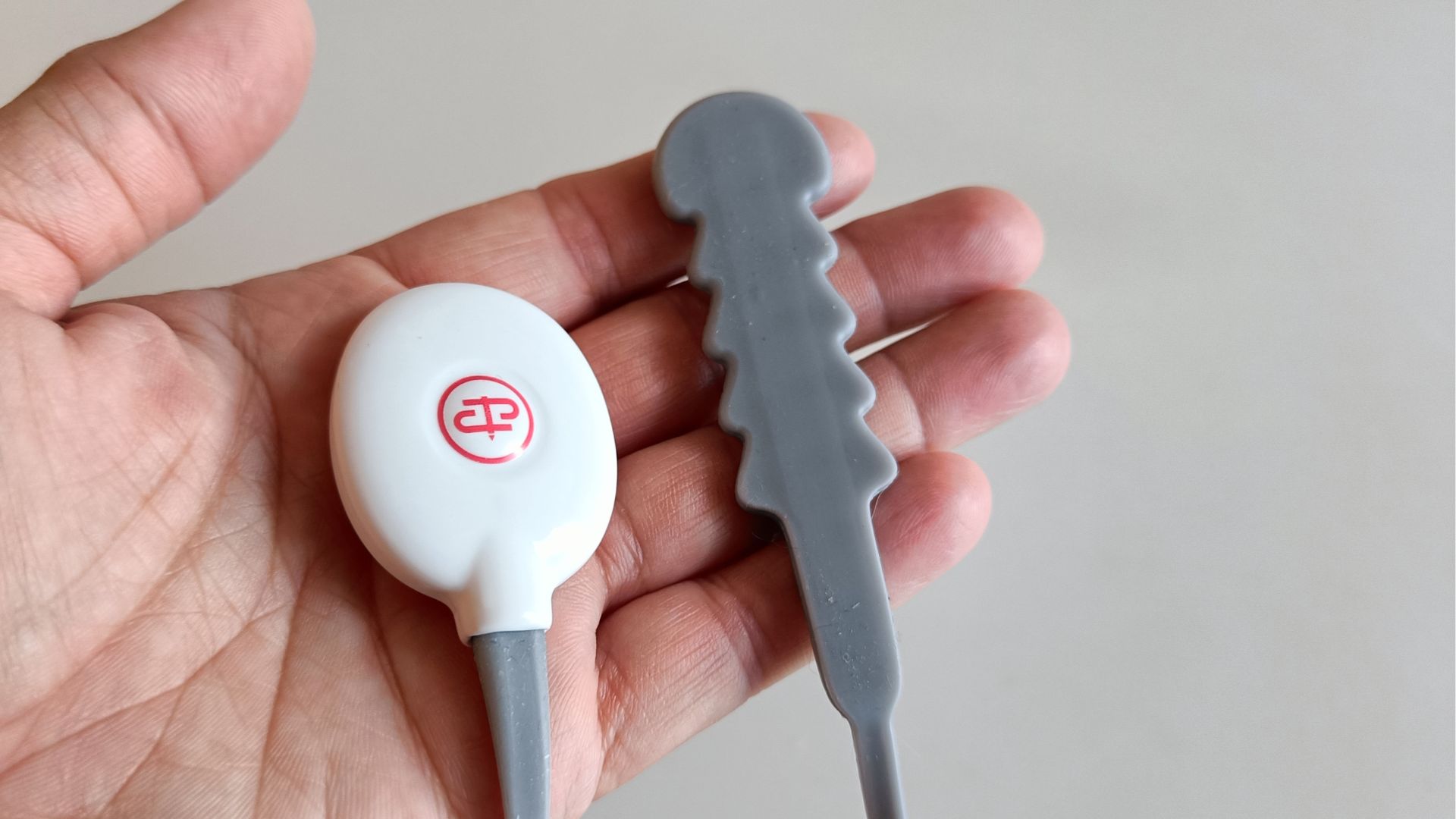
What is the Junofem Femfit pelvic floor trainer like to use?
How do you put the device in?
The Junofem Femfit pelvic floor trainer comes in a large, flat charging case. My first thought as I unboxed it was “oh god, how am I going to fit that in” before realising that it was the case…
The device itself is a slender strip of silicone (about the size of a finger, but flatter) containing eight sensors designed to measure the strength your pelvic floor muscles in detail. You insert the silicone ‘sensor’ part into your vagina, like a tampon, and then the wire leads to a small, external ‘pod’ containing the electronics - barely bigger than a £2 coin.
You could insert it and wear it, the pod tucked in your knickers, but it’s hard to see why you would. It’s designed for a short, daily exercise program. And the slender design means it can slip down if worn for any length of time.
App connectivity
The device pairs easily via Bluetooth, with a smartphone app. If you're not into the idea of a smartphone app linked to your pelvic floor trainer, this won't be the one for you. Perhaps a manual pelvic floor trainer like the Intimina KegelSmart 2 would be a better option. The Femfit app is what makes the workouts happen. Each day you spend around 10 minutes total on a set of four workouts. For each, you see a bird flying along and you try to follow a graph with it. The bird looks alarmingly like the bluebird that used to be the Twitter icon.
Across the bottom of your phone screen, you see eight strength bars for the pressure readings from the eight sensors on the Junofem Femfit pelvic floor trainer. The one on the left of the screen is nearest the entrance to your vagina. The one on the right is at the tummy end. This matters because the last one is black and the others are purple. It represents abdominal pressure, so you want the purple bars to be higher than the black bar, to ensure you’re engaging your pelvic floor right.
The first of the four exercises is the slowest: with Squeeze you have to follow the graph for long holds. The second is Rapid, follow the graph in short bursts. Then Enduro has a graph that expects you to squeeze at half strength, then full, then half again to practice control. Finally, Knack is a quick exercise in which you need to clench your muscles and then cough, they call the idea “squeeze before you sneeze”. If you've ever tried pelvic floor yoga, you'll be familiar with the process.
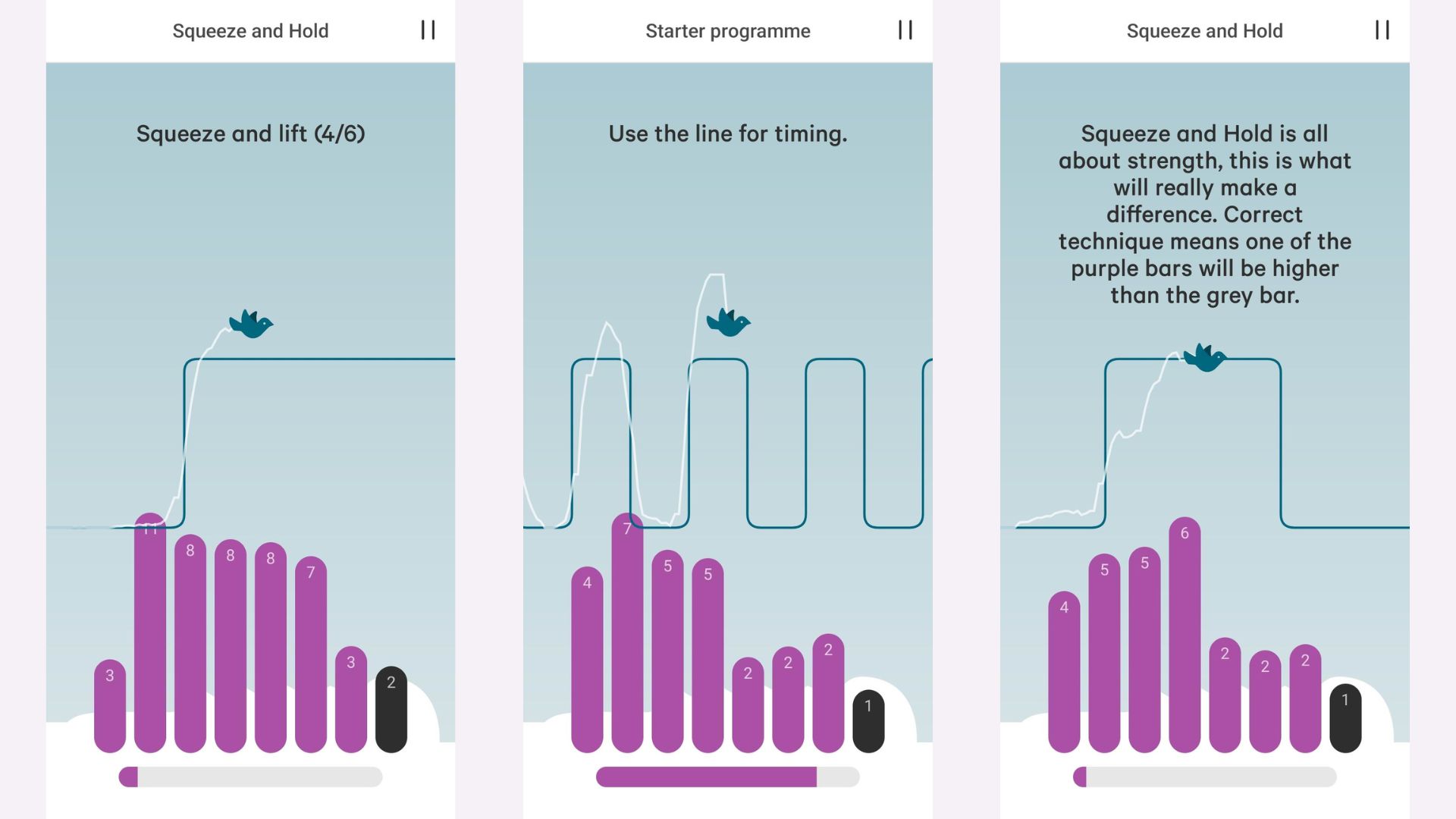
Building up your strength
The initial three-day programme to learn the exercises gets you doing them all but is so quick that I found myself doing it two or three times. Not so when you get on to the real deal: the Strength Builder programme. This programme takes around 10 minutes a day for 12 weeks. You start doing the exercises lying down, then sitting, and ultimately standing. Intensity and repetitions increase over time but I hardly noticed.
I liked the app. It felt hard to hit my targets sometimes but I found this was more motivational than miserable. The visual feedback of the bird in flight worked well. I resented the loss of time (I’m the kind of hurried person who thinks I’m winning at life if I brush my teeth in 30 seconds instead of giving them the full two minutes…) but I was pleased with my progress. There’s a journal that lets you log symptoms too – for example, you can log how leaky each day is.
Femfit is so comfortable - I didn't feel it there most of the time. The bad news is that the slim sensor can slip down easily – less so when lying down and more in the other positions. The good news is that on-screen feedback lets you see when it’s slipped. If it escaped your vagina, the first couple of purple bars on the left will register nothing so you'll be aware this has happened - pause and rejig. But of course, a different-shaped device would make this less of a problem.
The Femfit’s grey looks are a bit drab and its slim form can slip down. It looks like a medical device though, so that’s good if you’re coy about pelvic floor exercisers that look like vibrators (I’m sex-positive and toy-positive, having also tried and tested many of the best sex toys, but I can never get the airport security scene from Fight Club out of my head).
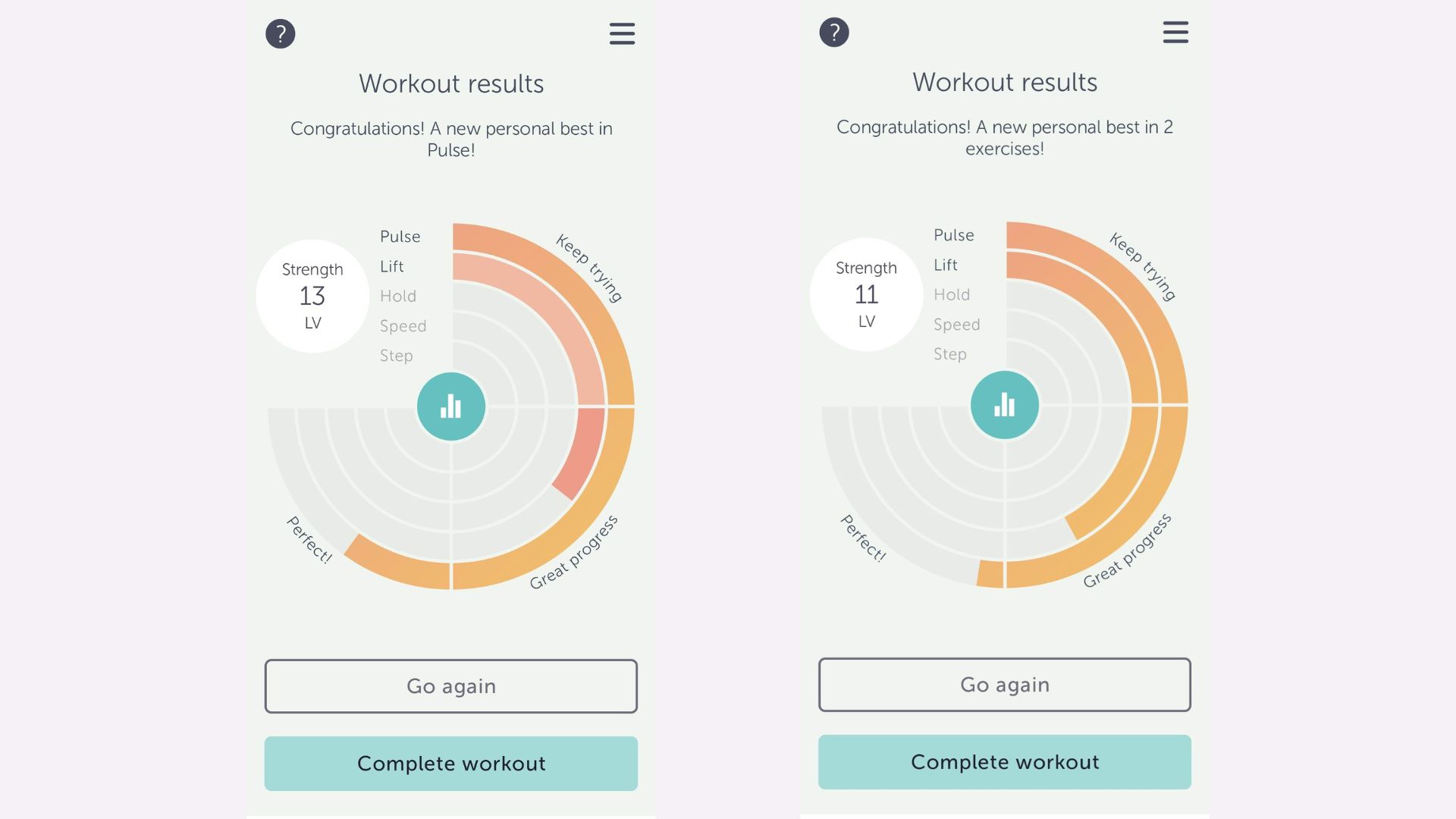
Maintaining your pelvic floor strength
After 12 weeks, you can switch to a Maintenance programme with the Junofem Femfit pelvic floor trainer, which only needs to be done three times a week (trickier to remember but a relief not to do it every day). You can pick whether to do the 15 or 23-minute one. You can even create your own programme. There are also programmes for taking part in research projects. Yes, academics can study your data remotely if you wish. And as noted, if you see a specialist for incontinence and they have a Femfit clinician code, you can opt to share your data with them.
You also get a monthly email updating you on progress and changes. For example, after four weeks I went from lying to sitting so the email told me what new challenges to expect. It’s nice that they don’t bombard you with emails – if you want advice, there are plenty of video explainers accessible from the app.
I found a noticeable improvement in my pelvic floor function from using the Junofem Femfit pelvic floor trainer. And I did manage to use it every day and follow the exercises. I didn’t log symptoms but I see how that could be handy. I didn’t look forward to the daily exercises because they took time, but I did see benefits and I could look forward to the next program and only needing to do them three times a week. It’s a bit like brushing your teeth – an essential bit of self-care for women that gets even more important as we age.
Noise and charging on the Junofem Femfit
Unlike vibrating pelvic floor exercisers like the Satisfyer Love Birds 2, which I've also tested, the Femfit is silent. You can use it anywhere. In fact, use it at bedtime and there’s a chance you’ll forget afterwards and fall asleep with it in. That’s not ideal - but it's not dangerous either. Just remove it, wash it with hand soap and let it air dry as usual. I tested it first thing in the morning so I didn’t forget: starting the day with a workout I could do while still lying down.
To charge, plug the case into the USB point. Running time is 15+ hours of use, which the makers say means you recharge it once a month. I’d say more like every 2 or 3 months. It lasts a really long time.
W&H verdict on the Junofem Femfit pelvic floor trainer
It works! I was impressed with the improvement in my pelvic floor function thanks to the Femfit. The detailed data helps teach you how to engage the right muscles - other devices just encourage you to clench generally. Once I’d nailed it, I found it easier to remember to use the muscles in the day too: the cliches like doing a few kegels at the bus stop or while waiting for the kettle to boil. For long-term improvement to your pelvic floor health, I'd recommend it.
So why not five stars? The sliding down is annoying but the main reason is it’s expensive. You could justify it as £5 a week for a year… but think of the long-term savings in Tena Lady, whether you’re struggling with incontinence or doing the exercises preventatively. Major pelvic floor problems can ruin our lives so much that we barely go out - and Femfit does a better job than budget pelvic floor trainers. But, it's still a lot of money and there are alternatives. So, it’s a solid 4.5… and a 5 if money’s no object.







